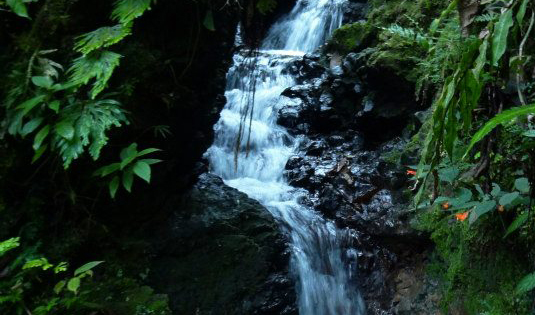The invaluable biodiversity of the rainforests and cloud forests is under serious threat. The desires to exploit them are great: deforestation for the production of tropical timber, slash-and-burn clearing to create palm oil plantations or cattle pastures, patenting of plant substances, urbanization.
Can we even afford to permanently damage important life support systems of our "spaceship" Earth, as the rainforests are an important "circulating pump" in the global water cycle? They are also the habitats for our closest relatives in the animal kingdom, namely the great apes, which have already been pushed back to small forest islands in Africa (chimpanzees, gorillas) and Southeast Asia (orangutans). Not to mention other rare animal species, such as the night monkeys in the cloud forest of Colombia or the myriad of insects, plants and microorganisms that these ecosystems are home to.
Undreamt-of treasures are about to be destroyed before we can even begin to explore their value for the survival of mankind. For example, as yet unknown ingredients of plants or the metabolic products of microorganisms could play an important role in combating resistant pathogens.
However, it is not only such considerations that should play a role here, as the cultural wealth of the indigenous peoples, who have always practiced sustainable use of these forests, is also under threat.
NGOs are trying to put a stop to the loss of diversity. The smaller they are and the more local they work, the more important our support is for them. This is particularly true of "Dapa Viva", which uses environmental education to teach the local population in Colombia about the value of the region's cloud forest in order to protect it from urbanization.
Venue: Zittau/Görlitz University of Applied Sciences, Görlitz Campus, House G I, lectures in Room 0.01, evening event in the auditorium, Furtstraße 2, 02826 Görlitz
Lecture program I:
14:30 - 14:45 Official welcome
Vice President for Education and International Affairs, Zittau/Görlitz University of Applied Sciences
14:45 - 15:00 Introduction to the topic
Prof. Dr. Christa Maria Heidger, Zittau/Görlitz University of Applied Sciences
15:00 - 15:45 Influence of palm oil cultivationon biodiversity
Dipl Ing. (FH) Denis Kupsch, M.Sc. Georg August University Göttingen,
Department of Conservation Biology, Johann Friedrich Blumenbach Institute of Zoology
15.45-16.15 Lost world on a knife-edge - Protection of and threats to the rainforests of the South American Guyana Shield
Dr. Rafael Ernst, Curator Herpetology, Museum of Zoology Senckenberg Natural History Collections Dresden
Break
16.30-17.00 Experience Rio Negro -Soft tourismin the Amazon Basin
Prof. Dr. Annette Drews, University of Applied Sciences Zittau/Görlitz, Faculty of Social Sciences
Lecture program II:
17.00-17.30 Dapa Viva - an NGO introduces itself:
The mountain that moved and the river that disappeared - environmental protection in the Colombian Andes
Ana Ocampo and Armin Hirche
17.30-18.00 Discussion round
Moderation: Dr. Christian Düker, Press and Public Relations Officer, Senckenberg Museum of Natural History Görlitz
A shuttle bus transfer from Zittau to Görlitz and back is available for students and staff.
Due to the limited number of places, please register in advance at a.bulcsu(at)hszg.de by 30.10.2015 at the latest. If there are still places available for last-minute bookings , please call 03583 61-1461 .
Departure to Görlitz: 13:30 in front of Haus Z III (Theodor-Körner-Allee 16)
Return journey to Zittau: 21:15 from Furtstraße
Accompanying program:
Special exhibition: OROVERDE - The Tropical Forest Foundation
Presentations: DapaViva
Photo exhibition of indigenous art by Prof. Dr. Christoph Althaus, Ostwestfalen-Lippe University of Applied Sciences
Evening program:
Salsa workshop for everyone with Michael Wolf and fundraiser for DapaViva
Download flyer: <media 28980 - download "TEXT, Flyer Td U-Goerlitz Regenwald Web, Flyer_TdU-Goerlitz_Regenwald_Web.pdf, 1.3 MB">![]() PDF</media>
PDF</media>
Contact for queries:

Andreas Bulcsu
03583-611461

